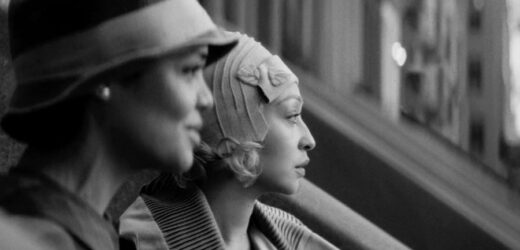When my light-skinned Black and mixed-race teenage son was little, I worried aloud to my best girlfriend about whether people would recognize him as Black—or whether, God forbid, he himself would decide to identify as even partially white. My girlfriend, who is also Black, would counter with, “Why would he want to be on that team? Seriously, have you seen that team?” Yes, I would say, all too much, for far too long. And we’d laugh, because it was funny-ish.
I was adopted by a white family and raised in a primarily white rural New England town. I then spent my life, well into adulthood, seeking out Blackness and trying to arrive at a place where I could feel unambiguous in my identity as a Black woman. My son opting to identify as white would have been the opposite of my journey. But as he grew older, I actually stopped worrying that he’d be taken as white—and became more worried that he’d be profiled by the police as Black. The irony.
Even if my son could “pass,” the concept is absolutely bewildering to him, for which I am exceedingly grateful. My white husband and I, along with our chosen Black family, have raised him to embrace and take pride in his Blackness; and while I’m quite sure that there are many more racial-identity conversations to come, at 16 years old, he pretty solidly sees himself as Black. I want that for him, because with Blackness comes a mighty legacy.
I told him that I’d been asked to write about a movie called Passing, based on a book from the late 1920s exploring the choice that some light-skinned Black people made (particularly just after slavery was abolished) to assume a white identity, both for their personal safety and for the privileges whiteness afforded. “Oh, like Michael Jackson?” he asked. “That’s a different pathology,” I said.
My son did have a point, though. His response underlined the idea that passing, or attempting to pass—whether for safety purposes during Jim Crow America or to survive the white-gaze in the 21st century—is a clear-eyed choice to denounce Blackness. And once you make that choice, as Passing’s co-protagonist Clare Kendry did, it isn’t always easy to live with the burden of that lie.
Rebecca Hall, the British actress best known for roles in Vicky Cristina Barcelona and The Town, who is of mixed-race heritage and who herself appears white (a different ball of wax than passing), makes her directorial debut with this stunningly deft adaptation of Harlem Renaissance writer Nella Larsen’s 1929 novel, Passing. The film stars Ruth Negga as Kendry and Tessa Thompson as Irene Redfield, childhood friends who reunite in adulthood after years of estrangement. The premise of the story is that Kendry and Redfield, both Black, are light-skinned enough to pass as white—which Kendry chooses to do, while Redfield for the most part remains in her Blackness. Kendry marries a wealthy white businessman, John (Alexander Skarsgård), and has a daughter who attends a boarding school in Switzerland. Residing with her family primarily in Europe, Kendry keeps her true racial identity a secret from both her husband and her daughter. Redfield, meanwhile, marries Brian (André Holland), a Black doctor, has two sons and serves on charity boards in high-society Harlem, where she lives with her family.
From a purely aesthetic standpoint, the film, shot in black and white, is an elegantly textured, rigorously restrained masterpiece. Although a reviewer has suggested that Hall chose to shoot in black and white to make it unavoidably clear that both women could pass for white, from the first scene in which Thompson and Negga appear together, the two immediately registered to me as Black. I don’t believe that’s because I know and am an admirer of their work. I think it’s because as Black folks, we somehow always see each other. And this, ultimately, is what makes the choice to pass—as depicted through Negga’s truly exquisite performance—not merely a survival mechanism or an act of cultural betrayal, but a horrible underestimation of the power and privilege that Blackness affords. Kendry had thought that “being” white, marrying a wealthy white man (despite his being a blatant racist) and having a white-presenting daughter was all she could ever want—and yet she longs to be in Redfield’s world, in community with Black people. Redfield has her own ambitions: She tries to carefully thread the needle between suitable Negro pride and respectable politics, clearly pleased that she can freely be Black and keep company with a renowned white male literary figure. She does concede, with an internal pause, that there is perhaps an unspoken connection among Black folks. “I suppose sometimes there is a thing,” she says, watching Kendry on the dance floor at a party for the Negro Welfare League. “A thing that can’t be registered.” In an interview with IndieWire Studio earlier this year, Negga described the idea of passing as loss: “A severing of one’s past, a severing of one’s self,” she said. It’s a sentiment that resonates with me deeply. It’s why I often take issue with transracial adoption—specifically, with white parents adopting and raising Black children in white environments, as my own parents did. It’s why I want my son to be proud and secure in his Blackness, because I am forever committed to sparing him the pain of what that kind of severance feels like. Among the film’s most affecting achievements is how Hall captures the stubbornly trenchant, rage-inducing frivolity of racism that seethes below the surface before exploding with casual indifference. At the start of the film, just after reconnecting, Kendry and Redfield are catching up in Kendry’s hotel room when her husband comes in calling after her, his voice a long, drawn-out baritone: “Niiiiggg?” Redfield pulls the brim of her hat down further as Kendry flutters about, greets her husband with a kiss, gets him a drink and then stands next to his chair to toast to “old friends.” Kendry lifts her flask, takes a swig and then breezily asks Redfield if she’d heard what her husband had called her. Before Redfield can answer, Kendry, her whiteness fastened on her like an expensive string of pearls, insists her husband explain his pet name for her. “When we were first married, this woman was as white as a lily,” he begins. “But as the years go by, she seems to be getting darker and darker.” Kendry opens the door to let in a Black bellhop before sitting on the arm of her husband’s chair to hear the rest of the story. He loops his arm around her waist like a master showing favor to his most-prized house slave—and for a minute, you think he knows that Kendry is actually Black and gets some kind of perverse kick out of it. And then, without changing a single note in the affable tenor of his explanation, he says, “So I told her, if you don’t look out, you’ll wake up one morning and find that you’ve turned into a nigger.” Kendry smiles with bright amusement at Redfield, who begins to laugh almost maniacally. Kendry laughs as well, and the two women giggle uncontrollably like the young girls they once were, now with a secret of unfathomable weight. Rebecca Carroll writes about race in America. Her memoir, Surviving the White Gaze, was published earlier this year. https://youtube.com/watch?v=trwq3CNCMkU%3Ffeature%3Doembed Source: Read Full Article


